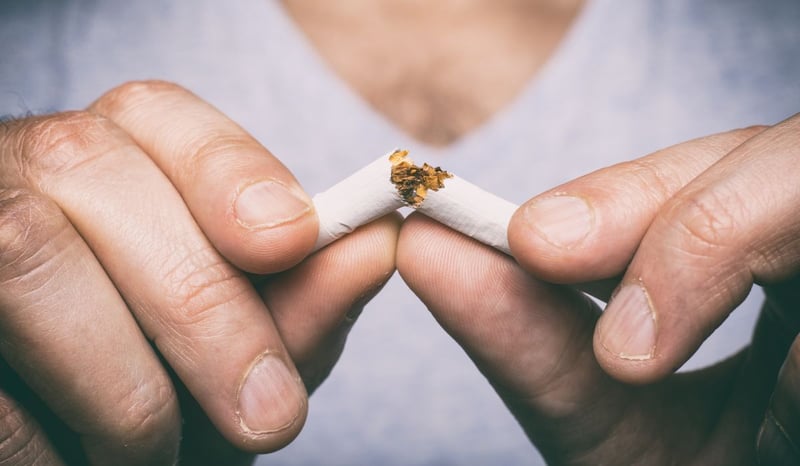
The Compass Oncology lung cancer specialists encourage everyone to take a moment on March 20th to observe "National Kick Butts Day.” This day focuses on the health risks of tobacco use, including smoking, as a part of our practice’s efforts to reduce the number of lung cancer cases diagnosed each year. According to the National Cancer Institute, that’s close to 700 cases each year in the Portland-Vancouver area.
There are a number of prescription and over-the-counter nicotine replacement therapies that can help greatly when stopping the use of tobacco, but quitting typically takes more than that. It requires a change in your lifestyle. While quitting smoking can be hard, it’s not impossible!
Here are six things you can do to help you quit smoking and get on the path to reducing your risks of lung cancer, heart disease, and stroke.
1. Prepare before you quit smoking.
Preparation is the key to success in any new endeavor. Some people are able to quit smoking cold turkey—but most other people need a plan. In all honesty, this is one of the best things you can do to set yourself up for success since a quit plan gives you ways to stay focused on and motivated about your goal. Different approaches work for different people, so be open and honest about your needs, or you may end up reverting back to your smoking habit quickly, which can be discouraging.
There are a variety of ways to get a plan in place, including the Create My Quit Plan created by the Tobacco Control Research Branch of the National Cancer Institute. And remember, decide on a specific quit date and stick to it. Don’t try to pick a date if you’re in the middle of a major life change, such as starting a new job or the death of a loved one. You may end up reverting back to your smoking habit quickly, which can be discouraging.
In the days leading up to your quit date, prepare your environment by doing some deep cleaning. This will help rid your environment of the smell of cigarette smoke, decrease temptation, and help you start fresh.
- Clean out your car of any ashtrays or cigarette butts.
- Vacuum and steam clean the seats and carpet in your car and any other fabric inside your home, including carpets, rugs, and couches.
- Wash your window coverings and anything else that may have absorbed the smell of tobacco.
- Wipe down appliances with white distilled vinegar.
There are also many products on the market used specifically for eliminating smoke odor that can be found in local hardware stores, like spray cleaners and air purifiers.
2. Find a support system.
You don’t have to quit alone. Accountability will help you stick to your goals, so let friends and family know that you’ve decided to quit smoking or using any other type of tobacco product and ask them to hold you accountable. Resisting temptations to give in to your habit will be easier to accomplish if you have someone there to remind you why you decided to quit in the first place.
Online support is also a great way to kick the habit for good. Find an online community or forum specifically for people focused on quitting the use of tobacco; these people will be experiencing the same challenges as you are and you can support each other through the process.
- Smokefree.gov, an online support resource
- QuitGuide, a free mobile app
Don’t be afraid to lean on your support system when you need them. They are there to help!
3. Avoid activities likely to trigger a craving.
Triggers are anything (including people, places, things, and even certain situations) that can set off your urge to smoke. You might find that you would always smoke after a meal, with a cup of coffee, or when you’re drinking alcohol. To overcome your new “quit smoking” challenge, try to avoid these triggers on quitting day and in the days to follow. Some ways that you can do this may include:
- Tossing out remaining cigarettes, lighters, ashtrays, or any other items related to smoking
- Drinking water instead of caffeine and/or alcohol--two beverages that have been known to trigger cigarette cravings
- Spending less time with smokers and more time with non-smokers
- Eating out at restaurants where smoking is prohibited
- Focusing on getting more rest
- Finding other ways to reduce your stress level
It’s almost guaranteed that a trigger will come along urging you to light up. If this happens, try to find other activities that you can do instead that might help distract you until the craving goes away or at least seems manageable. For example, if you used to take “smoke breaks” at work, use that time to take a walk around the building or parking lot instead. Not only can it help you get through the cravings, but it’s also beneficial to your heart and lungs.
4. Take it one minute at a time.
Quitting any habit is tough. The important thing to remember is why you decided to quit smoking and remind yourself of the positive outcomes you’d like to see. Most people who decide to quit tobacco do so to improve their health and reduce their risk of getting lung cancer. According to the American Cancer Society, you can experience these benefits just minutes after quitting:
- After just 20 minutes, your heart rate and blood pressure begin to drop
- After 12 hours, the carbon monoxide level (the colorless, odorless toxic gas tobacco smoke produces) in your blood drops to normal
- After 2-3 weeks, your risk of heart attack decreases
- After 5 years, your risk of mouth throat, esophagus, and bladder cancers are cut in half.
The benefits just go on from there. And you’ll notice some immediate benefits after quitting, like food tasting better, no more yellowing in your teeth and fingernails, and better lung function. Keeping these health reasons at the forefront of your mind and paying attention to how these benefits add up can really help you stay focused on your goal.
5. Stay busy
Staying busy can really help keep you distracted from cravings that make you want to smoke. There are a variety of activities you could try, which could include:
- Chewing gum or sucking on hard candy
- Drinking lots of water
- Exercise, such as walking, running, biking, yoga, swimming, weight lifting, etc.
- Chose to eat at restaurants that do not have smoking sections
- Going to see a movie
- Prayer, meditation, and/or deep breathing exercises
- Reading
- Shopping
- Spending time with friends that don’t smoke
Research shows that being active can help ease some tobacco withdrawal symptoms. Whenever you feel the urge to smoke, get up and get moving, focusing on activities that will help you push through.
6. Reward yourself.
Rewarding yourself throughout this process can be a great motivational tool to help you reach success. Many smokers associate ‘reward’ with cigarettes--so when it comes time to quit, they often feel as though they’re missing out on something. To keep this from happening, you have to train your brain to associate ‘reward’ with a healthier alternative.
Decide on something to reward yourself with each time to get through a set amount of time without smoking. The health benefits alone may be reward enough for some, but for an extra motivational push, why not treat yourself for your hard work?
- Keep track of the money you were previously spending on cigarettes and watch your bank account grow!
- Use the money to go out to a nice lunch or dinner in a smoke-free environment
- Pamper yourself by relaxing with a massage instead of relaxing with a cigarette
- Join a gym with the money saved from not buying cigarettes and take care of your body now that your heart and lungs are healthier
- Strengthen your willpower over time. Try a challenge like, “After the first full week without a cigarette, I’ll treat myself to my favorite dessert.” Then after two full weeks, another treat. One unhealthy dessert is much better than the long-term effects of tobacco – just be sure to keep them in moderation.
Eventually, your brain will start to find enjoyment in things other than smoking, making those difficult days a bit easier for you to get through. Remember, smoking isn’t about what you’re giving up, it’s about what you’re gaining! If quitting smoking seems overwhelming or impossible, research ways other people were successful in quitting. You’ll find that it is entirely possible to live a healthy, smoke-free life.
This year, Kick Butts Day is on March 31st, and events are scheduled in various locations in and around the Portland-Vancouver area. Visit their website to learn more about Kick Butts Day activities.
🔎 Related Read: How to Reduce Your Risk of Developing Lung Cancer
Originally published May 2017. Updated September 2022.


